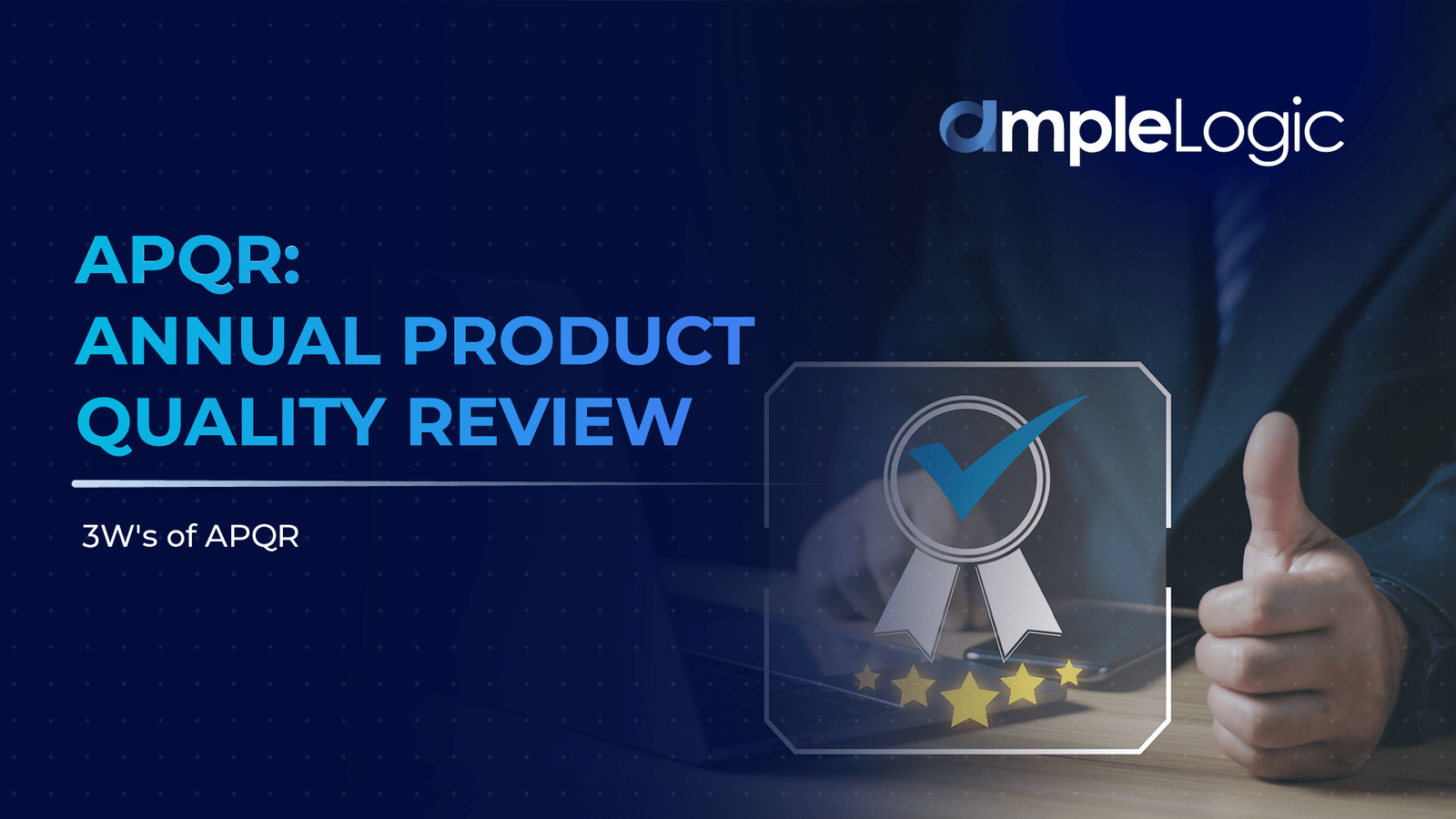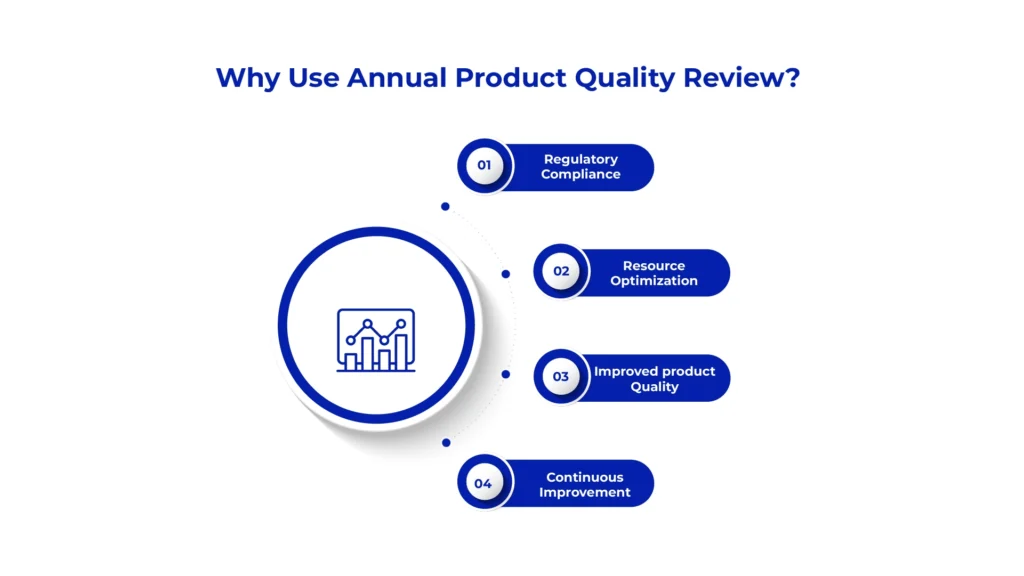
Embarking on an exploration of the essential aspects surrounding Annual Product Quality Review (APQR), this investigation delves into the fundamental questions of What, Why, and Where. As a cornerstone of quality management within regulated industries, it holds significant importance in assessing product quality standards and manufacturing processes. By dissecting these key components, this exploration aims to provide a comprehensive understanding of its purpose, significance, and application across various sectors. Let’s delve deeper into the 3 W’s of APQR to unravel its intricacies and unveil its impact on ensuring quality, compliance, and continuous improvement within regulated environments.
What is APQR ?
The Annual Product Quality Review (APQR), conducted in regulated industries, evaluates product quality standards and manufacturing processes comprehensively. It confirms adherence to quality attributes and specifications mandated by regulations, ensures process consistency, and assesses changes to prevent adverse effects on quality or compliance. PQR also identifies improvement opportunities, fostering continuous improvement and regulatory adherence within regulated industries.
Why Use Annual Product Quality Review?

The implementation of APQR offers numerous benefits for pharmaceutical manufacturers, which include:
- Regulatory Compliance: It demonstrates a manufacturer’s dedication to quality and compliance, reducing the risk of regulatory penalties, product recalls, or import restrictions.
- Resource Optimization: By identifying potential quality issues and improvement areas, PQRs enable manufacturers to address problems before they escalate.
- Improved Product Quality: It helps maintain the highest quality standards for products, safeguarding patient safety and enhancing the manufacturer’s reputation.
- Continuous Improvement: PQR facilitates the ongoing evaluation and optimization of manufacturing processes, leading to increased efficiency and productivity.
Where is Annual Product Quality Review Required?
The versatile nature of the APQR allows its application into numerous industries. Essentially, any sector involved in producing goods can leverage APQR to monitor and assess product quality and manufacturing processes.
Pharmaceuticals: APQR is a regulatory requirement within the pharmaceutical industry to evaluate product quality, safety, and efficacy over time, ensuring adherence to ongoing compliance with Good Manufacturing Practices (GMP).
Biotechnology: Biotechnology companies producing biologics, vaccines, and other biological products are also subject to regulatory requirements for periodic quality reviews to assess product quality and compliance.
Medical Devices: Manufacturers of medical devices are often required to conduct periodic quality reviews to assess product performance, safety, and compliance with regulatory standards such as ISO 13485.
Gene Therapy: APQR in gene therapy ensures safety, efficacy, and regulatory compliance through systematic evaluations, driving continuous improvement. Adherence to PQR protocols upholds quality standards, advancing medical science globally.
Cosmetics: While not as strictly regulated as pharmaceuticals, the cosmetics industry may also benefit from conducting periodic quality reviews to ensure product safety, efficacy, and compliance with regulatory requirements.
Food Industry: In the food and beverage industry, companies may implement similar quality review processes to assess product quality, safety, and compliance with food safety regulations.
Chemicals and Agrochemicals: Manufacturers of chemicals, pesticides, and fertilizers may conduct periodic quality reviews to evaluate product quality, efficacy, and compliance with regulatory standards.
Automotive industry: Real-time monitoring of performance parameters enables timely corrective actions to uphold high-quality standards. This analysis of trends, compliance management, and root cause identification for quality issues enhances customer satisfaction and ensures efficient regulatory compliance.Top of Form
Breaking Down Barriers: APQR's Impact on Overcoming Challenges
Explore how APQR helps pharmaceutical manufacturers break through obstacles, enabling them to tackle industry challenges with confidence and precision.
Mastering Data Management and Integrity: APQR simplifies data handling and ensures compliance by streamlining data collection, analysis, and storage processes.
Identifying OOS, OOT: With APQR’s analytical capabilities, identifying OOS and OOT instances becomes swift and efficient, fostering proactive quality management. Its systematic approach enables timely intervention and corrective actions to enhance product quality and regulatory compliance.
Optimising Resources & Processes: APQR enables manufacturers to identify inefficiencies and streamline workflows. The application aids in adopting a culture of continuous improvement by providing actionable insights derived from analysis of historic and current processes.
Regulatory Changes: Staying up to date with evolving regulatory requirements can be challenging, particularly for global pharmaceutical companies operating in multiple markets. APQR provides a centralized platform for quality evaluation and documentation. It ensures adherence to regulatory mandates across global markets, facilitating market access for pharmaceutical products.
Conclusion
Annual Product Quality Review (APQR) are vital for ensuring the safety, efficacy, and regulatory compliance of pharmaceutical products. By providing a systematic framework for evaluating product quality, manufacturing processes, and regulatory standards, it contributes to improved patient outcomes, enhanced industry reputation, and reduced risk for pharmaceutical manufacturers. Embracing it is an integral part of a robust quality management system can help companies navigate the complex regulatory landscape and maintain a competitive edge in the dynamic pharmaceutical industry.





























